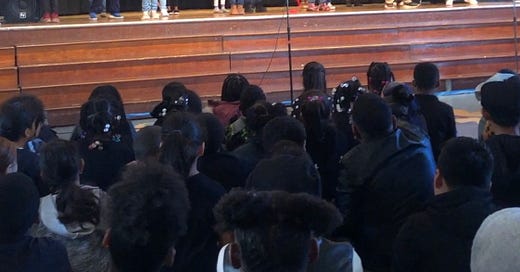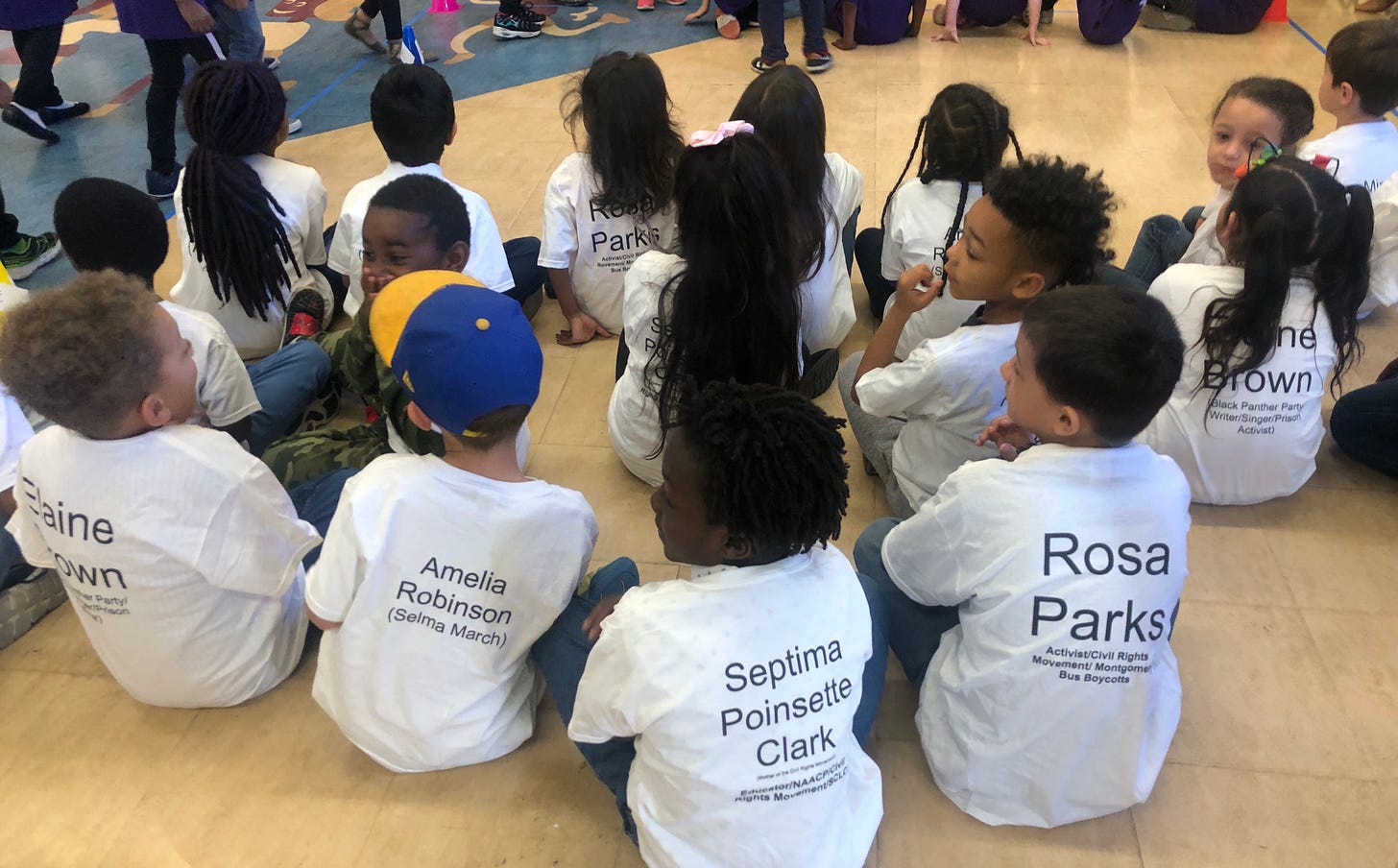One of my favorite days of the year is the Black History Month performance at my kids’ school. It involves 300 or so kids taking to a dinky stage in the “multi-purpose room” (aka gym/theater/cafeteria/everythingelse), one class at a time, to sing and dance to the Sulwe Song, recite “And Still I Rise” by Maya Angelou, and/or generally invoke the names and ideas of Black heroes—some long dead, some standing in front of their own classrooms each day. Our school goes deep on everything from Black Panthers to Black Lives Matters, Rosa Parks to Marsha P. Johnson, Malcolm X to, well yes, Steph Curry (it’s Oakland, after all).
I stand in the back and try to keep my crying to a quiet snuffle, even though I could—if I really let it go—sob at the great gift of being back in touch with such basic goodness and light that is an elementary school performance of this kind.
You likely don’t need to be reminded, but just in case you forgot: there is always the one kid who goes way outside of the planned choreography and moves his body in only the way he could at this exact moment on Planet Earth. You know you’ll never see someone’s corporeal essence expressed in quite that way again, and you’re just grateful you were at that latitude and longitude on that day to see it.
There is always the other kid who appears timid at first, but then looks the adults straight in the eyes, chin held high, and recites her line like she’s running for president and you’d put your entire life savings on the likelihood that she will. She reminds you of something true and precious: that some people possess a dignity that takes your breath away and it has nothing to do with their age, appearance, or status in the outside world.
There is always the kid who searches the audience for a glimpse of their caregiver and, upon landing their gaze on her, stands taller, sings louder, and beams a bright light of being well loved on everyone around them. This little soul reminds you that we are all just looking for our mom in the crowd, no matter how old we are or theoretically sophisticated we pretend to be.
Add to all this the layer of Black history and you’ve got yourself a truly sacred space and time—a Black-majority school where Black kids learn that their ancestors shaped this country in profound and righteous ways, and kids of other racial backgrounds bask in the learnings of proximity and solidarity. This is America as it’s almost never been—on a national stage—and almost always is—when you create communities where kids learn and play side-by-side, day-after-day and fall in a kind of mutual love with one another because of and in spite of their differences (and all the stupid shit adults do to keep them apart).
I’m not saying it’s easy or perfect, rainbows and unicorns, to be at an integrating school. It can be socially complex. It’s hard, for example, to figure out ways to support my older daughter’s relationship with a girl in her class who comes from a family where there are way more children to manage and transport, and whose parents don’t speak English; it’s so intuitive to text the one other White girl’s mom and plan a playdate or a sleepover. But I keep trying. Maya keeps trying. Both of us are looking for ways to see the water we swim in (not all families use the language of “playdates” and “sleepovers,” much less feel comfortable with them) and get creative about building real relationships anyway.
It’s economically complex. Sending our kids to a school where the majority of kids’ families qualify for free and reduced lunch does nothing to close the wealth gap in Oakland. We can redistribute a bit of our own wealth into the school’s budget and individual teacher’s DonorsChoose campaigns, quietly pass along a Safeway gift card to the community school manager when a family needs food, pick up snacks and band-aids and cheerleading uniform fees, and whatever else might make life easier on educators and parents in our community. But it never feels like much in a city where even our teachers can barely afford housing and families keep moving further and further outside of Oakland proper.
It’s academically complex. I sat last night in a school site council meeting where we are trying to set our goals for next year. Right now, only about 30% of our Black “scholars,” as our awesome new principal calls them, can read on grade level or above. We decide our shared goal is that 80% of all kids will read on or above grade level next year. I wonder: is that too much, setting us up for collective failure? Or is it not high enough? Shouldn’t our goal always be 100% of all kids reading on grade level, come hell or high water, pandemics or phonics, no matter the color of their skin or number of books in their caregiver’s house?
Sometimes its deflating and sad and plants a little seed of existential dread in my stomach—does any of it really matter?
But then I remember—especially on a day like the day those kids take to the stage—that I get to live in this Oakland, the complex, beautiful, growth-producing kind where not everyone shares my cultural references or even speaks the same language that I do, but we bump up against one another lovingly, sometimes unskillfully, mostly faithfully, and figure out how to watch our kids grow up together.
I get to live in this America, the version of our nation where we acknowledge that slavery is foundational to our history and that we are still in a process of understanding what that means, how to re-narrativize and repair, and that Black Americans have been instrumental in shaping some of the best features and flare of our democracy. This America where my White kids are taught, not that they are inherently “bad” as some Americans at the moment would suggest, but that they are no better than anyone else, and in fact, have both unearned privileges because of the color of their skin and an invitation to be part of a new season of whiteness where we tell more accurate truths, reinvest in community, grow stronger muscles for solidarity and the redistribution of opportunities, power, space, time, and money. This America where there has been and continues to be a lot of pain and also so much joy. This America, where this Friday, these kids will each have their turn in the spotlight breakdancing, shout-singing, forgetting their lines, smiling at their grandmothers.
That’s the thing that some people don’t seem to understand these days. There’s no way to redact or micromanage the American inheritance. Generational change cannot be censored or banned or burned; it’s a light inside of each one of these little kids, as inevitable as the sun rising each day—cyclical, inevitable, unstoppable. They will remake the nation by their very existence, whether you let them read the books that scare you or not. They will sing a new song, and you won’t be able to stop them because the lyrics are forming in real time, born from their collective genius, belted out from their mycelium lungs. Listen and you will hear the future of this country, thrumming sweetly under all the cacophony of adult fears. It’s one of the most painful, sweetest songs I’ve ever heard.
Need a good cry? Imagine 25 kids singing this:






As a White woman who grew up in exactly the kind of environment that you all are raising your girls-- one of few white students in a majority Black public school in a majority Black city (DC)-- I applaud you for making the choices you're making, doing the intentional work you're doing as a parent and a citizen, because it really does matter. Does growing up that way give me a pass on racism? Absolutely not. But it does give me a particular perspective on race and particularly Whiteness that most White people in America lack, which I wouldn't trade for anything.
One of the most insidious aspects of Whiteness is how it normalizes itself and implicitly calls into question anything outside of itself. So, when White kids never, ever see a figure of authority in their lives (teacher, crossing guard, police officer, city council member, etc.) until maybe when they get to be adults they don't know how to process BIPOC as authority figures. They have been trained to resist it without even realizing it. When White children aren't surrounded by children of color (like, really surrounded. Not that there are a handful of token BIPOC children in their whole school) so that their social environment doesn't center them implicitly, then they never learn how to just interact with people as people, not as representatives of a group that feels somehow foreign, different, or implicitly "abnormal".
Raising children the way you are does trouble the notion of Whiteness on a really essential level, even if it doesn't fix everything. Your daughters will move through the world in a way that threatens the notion of their own supremacy. They will be able to see through the categorization of people and the implicit hierarchies of human value that are at the heart of White supremacy, and we need that. We need them.
Is growing up like they are always easy? Nope. But growing up is hard for all kinds of people. It seems to me you're choosing the right kind of hard.
I miss elementary school auditoriums and the magic that happens there.
Let me add a few more images- the baby chuckling in the audience to hear his sister's voice from the stage, the toddler climbing his best up the stairs to be part of it all, the little older toddler saying loudly in the audience at every break in the action: "I wonder what's going to happen!"
And the audience smiling at the way an elementary school is a family place.